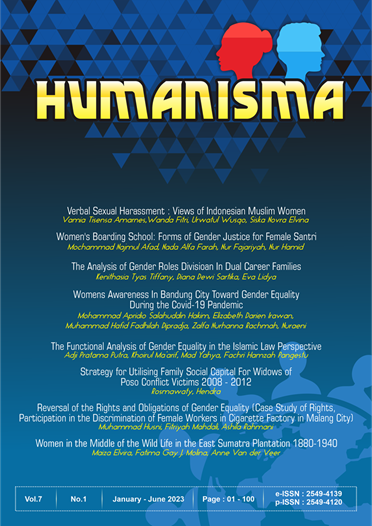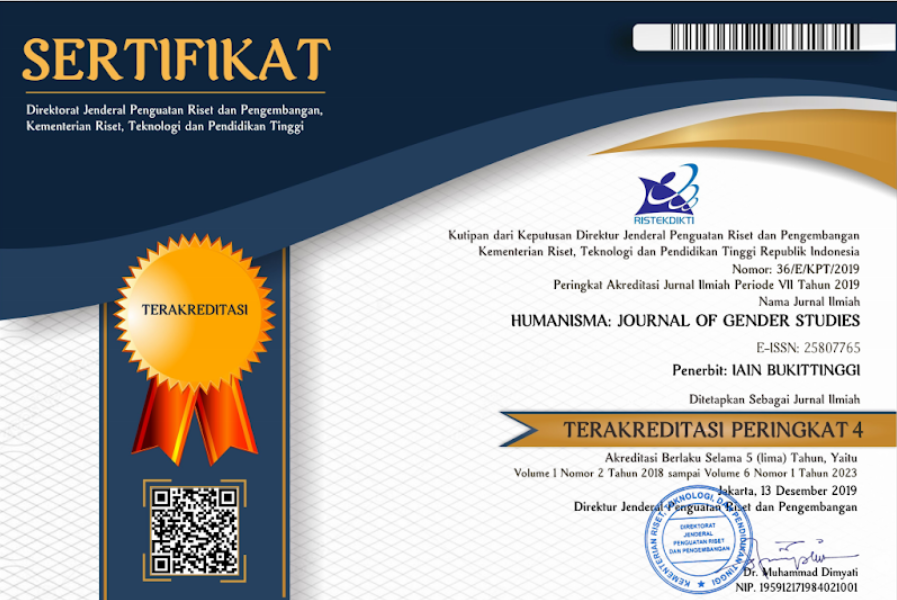Reversal of the Rights and Obligations of Gender Equality (Case Study of Rights, Participation in the Discrimination of Female Workers in Cigarette Factory in Malang City)
DOI:
https://doi.org/10.30983/humanisme.v7i1.6277Keywords:
Gender Equality and Women’s Rights, Cigarette FactoryAbstract
Changes in people's behavior towards women's lack of equality and human rights Women as a whole have not been able to gain the right to grow and equate with men. Women tend to become marginalized individuals and become subordinate to men. We know why many cigarette factories employ women as laborers, while men are employed in important roles such as corporate managers, overseers, and staff of tobacco companies. So why are there so many women who are placed as workers or regular employees? This indicates a lack of equality for women, and always assume that man is still regarded as a strong figure and responsible for finding and positioning the company or factory. Whereas women are weaker figures assigned to organize and as ordinary employers may even be merely appropriate for household affairs. When women enter the world of work, they are still faced with disenchanted behavior and a lack of justice for equality between men and women. In the competition of the working world, women are also in the lowest position compared with men. It is needed to give women opportunities to get equal access to men. This goal can be realized if the regulations made by the state are carried out properly and if the company is committed to giving fair treatment to women, eliminating gender discrimination, and providing human rights and equality between men and women.
References
Effendi, A. Masyur. 2019. Human Rights Sites in International / National Law, Bandung: Alumni Publishers.
Rochaeti, Nur 7-8 February 2017 "Cedaw and National Law on Women's Rights". Semarang: Paper on Gender Perspective Education Training,
Ainun Zanariah, Abd Aziz. 2018. Gender Differences in Spoken Discourse At The Workplace, A Dissertation Submitted In Fulfillment Of The AsA Second Language Master Degree In Second Language, Faculty Of Language And Linguistics. Kuala Lumpur: University of Malaya.
Suratman. 2020. Complete Dictionary of Psychology. Jakarta: Rineka Cipta.
Abdullah, Irwan. 2003. Sangkan Paran Gender. Yogyakarta: Student Library.
Rachmadewi, et al., 2020, Evaluation Study of the Implementation of Sectoral Gender (Kkg) Equity Program at Central Level, East Java and West Sumatra Provinces, Research and Development Center for Health and Quality Improvement of Women,
Ridjal, Fauzie (Ed), 2019, Dynamics of the Women's Movement in Indonesia, Tiara Wacana, Yogyakarta.
Astute, TriMarhaeni Pudji. (2018) Construction of Gender in Social Reality, Semarang: Semarang State University Press.
Budiardjo, Miriam. (2019) Basics of Political Science. Jakarta: Publisher PT. Gramedia Main Library.
Muhammad Bin Amr Nawawi. Syarh ‘Uqud Al-Lujain Fi Bayan Huquq Az-Zujain. Surabaya: Dar An-Nashr Al-Mishriyah.
Faqih, Mansour. 1995. Gender Analysis and Social Transformation. Yogyakarta: Learning Library.
Harijani, D.R. 2001. Village Women's Work Ethic, Yogyakarta, Philosophy Press
Muhammad Ali.1413 H / 1992. Ra'i Al-Bayan; Interpretation of Ayat Al-Ahkam Min Al-Quran. Damascus: Maktabah Al-Ghazali.
Imran, Ali. 20002. Education Policy in Indonesia. Jakarta: PT. Earth Literacy.
Hamidah, Tutik. 2011. Women's Fiqh is based on gender justice. MALANG: UIN-MALIKI PRESS (MEMBER OF IKAPI) MALANG.
Burhanuddin, Jajat Oman Fathurahman (2004), About Women of Islam, Discourse and Movement, Jakarta: Gramedia Main Library Working Together with Islamic and Community Studies (PPIM).
Dzuhayatin, Siti Ruhaini (2021) "Feminist Mindset in Islamic Discourse in Indonesia '' In Siti Ruhaini Dzuhayatin, Budhy Munawar Rahman, Nasaruddin Umar et al. Methodological Reconstruction of Gender Equality Discourse in Islam Yogyakarta: Collaboration between Sunan Kalijaga IAIN PSW Yogyakarta, Mc. Gill-ICIHEP and Learning Library.
Ilyas, Yunahar (2021) Feminism in the Study of Classical and Contemporary Qur'anic Interpretations, Yogyakarta: Learning Library
Downloads
Published
How to Cite
Issue
Section
Citation Check
License
Copyright (c) 2023 Muhammad Husni,Fitriyah Mahdali, Ashila Rahmani

This work is licensed under a Creative Commons Attribution-ShareAlike 4.0 International License.
Authors who publish with this journal agree to the following terms:
- Authors retain copyright and grant the journal right of first publication with the work simultaneously licensed under a Creative Commons Attribution-ShareAlike 4.0. that allows others to share the work with an acknowledgment of the work's authorship and initial publication in this journal.
- Authors are able to enter into separate, additional contractual arrangements for the non-exclusive distribution of the journal's published version of the work (e.g., post it to an institutional repository or publish it in a book), with an acknowledgment of its initial publication in this journal.
- Authors are permitted and encouraged to post their work online (e.g., in institutional repositories or on their website) prior to and during the submission process, as it can lead to productive exchanges, as well as earlier and greater citation of published work (See The Effect of Open Access).



